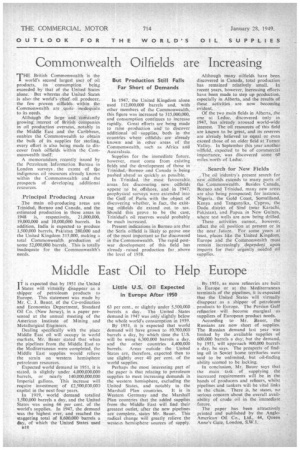Middle East Oil to Help Europe
Page 24

If you've noticed an error in this article please click here to report it so we can fix it.
Little U.S. Oil Expected in Europe After 1950
I T is expected that by 1951 the United States will virtually disappear as a shipper of petroleum products to Europe. This statement was made by Mr. C. J. Bauer, of the Co-ordination and Economics Department, Standard Oil Co. (New Jersey), in a paper presented at the annual meeting of the American Institute of Mining and Metallurgical Engineers.
Dealing specifically with the place Middle East oil will occupy in world markets, Mr. Bauer stated that when the pipelines from the Middle East to the Mediterranean were completed, the Middle East supplies would relieve the strain on western hemisphere petroleum resources.
Expected world demand in 1951, it is stated, is slightly under 4,000,000.000 barrels, or nearly 140,000,000,000 Imperial gallons. This increase will require investment of £2,500,030,003 capital in the next four years.
In 1919, world • demand totalled 1,500,000 barrels a day, and the United States was using 66 per cent, of the world's supplies. In 1947, the demand was the highest ever, and reached the ataggering total of 8,600,000 barrels a day, of which the' United States used
63 per cent., or slightly under 5,500,000 barrels a day. • The . United . States demand in 1947 was onlY-slightly.below the whole world's consumption in 1939.
By 1951, it is expected that world demand will have grown to 10,700,000 barrels a day, by which time the U.S. will be using 6,300,000 barrels a day, and the other countries 4,400,000 barrels. Areas outside the United States are, therefore, expected then to use slightly over 40 per cent. of the world supplies.
Perhaps the most interesting part of the paper is that relating to petroleum supplies to meet increasing demands in the western hemisphere, excluding the United States, and notably in the Marshall Plan countries. It is in Western Germany and the Marshall Plan countries that the added supplies from the Middle East will find their .greatest outlet, after the new pipelines are complete,. states Mr. Bauer. This radical change will greatly relieve the western hemisphere sources of supply. By 1951, as snore refineries are built in Europe. or at the Mediterranean terminals of the pipelines, it is expected that the United States will virtually disappear as a shipper of petroleum products to Europe. The Persian Gulf refineries, will become marginal as suppliers of European product needs.
According to Mr. Bauer, the Russians are now short of supplies. The Russian demand last year was limited by the available supplies of 600,000 barrels a day; but the demand, by 1951, will approach 900,000 barrels a day, he says. The prospects of finding oil in Soviet home territories were said to be unlimited, but oil-finding ability seemed to be lacking.
In conclusion, Mr. Bauer says that the main task of supplying the increased requirements will be in the hands of producers and refiners, whilst pipelines and tankers will be vital links in the chain. There is, he states, no serious concern about the overall availability of crude oil in the immediate future.
The paper has been attractively printed arid published by the AngloAmerican Oil Co., Ltd., 44, Queen Anne's Gate, London, S.W.1.




























